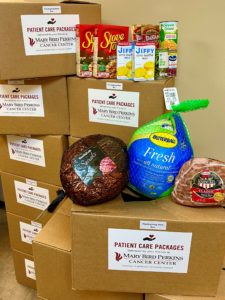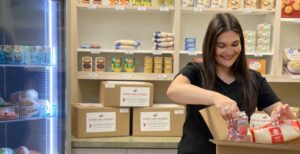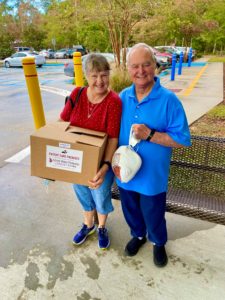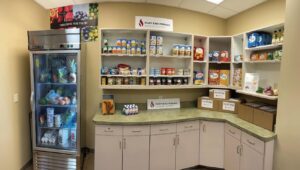Initiated in 2019, the therapeutic food pantry offers patients facing financial struggles, brought on by a cancer diagnosis, an avenue to maintain a diverse and nutritious diet through support from the community.
Food; It’s Not Just for Thought
“It’s hard for me to accept help. I don’t want to take something that somebody else might need more than I do.” – Sandria Mclemore

What began as a hard sell for Sandria ended up being one of the biggest blessings she’s received since learning she was facing her third cancer battle within twelve years in March. Following the diagnosis, one of the 68-year-old’s biggest concerns was covering gas costs to get to and from her daily radiation, but she also knew buying groceries would be a struggle. Thanks to generous donors, patients, including Sandria, have had access to transportation assistance at the Cancer Center for many years. The therapeutic food pantry, though, was a new solution she was surprised to learn about, and it was one that could help her tackle the latter of the two problems.
Sandria, who is on a fixed monthly income, was eligible to receive assistance from the therapeutic food pantry after being verified through a program to screen for food insecurity. At first, she was worried her participation might take groceries away from someone in a more precarious situation.
A Tailor-Made Approach to Nutrition
She quickly reevaluated the offer, after meeting one-on-one with Meredith Bechac, the Cancer Center’s registered dietician, who evaluates the food insecurity of patients and handles weekly grocery distributions. Meredith, who also works with physicians to custom fit nutrition plans for each participating patient, was ultimately able to persuade Sandria to participate. Choosing to accept the groceries has been a decision she doesn’t regret.
If the therapeutic food pantry wasn’t an option for her, Sandria says she would have to purchase more starches and ‘stretcher foods,’ like beans and rice, for herself. The service has allowed for more variety in her diet, including things she would not have been able to afford otherwise. She still remembers opening that first package of groceries.
“Right on top of it, was a 2-pound bag of pistachios [and] a double pack of the most wonderful Swiss cheese,” Sandria recalls.
Beyond providing a wide range of food options, Meredith tailors what a patient receives from the pantry depending on their treatment needs, with input from physicians. In Sandria’s case, that was a diet high in protein.
“We not only want to provide them with food, but we want to provide them with the right quality food and ingredients for their diagnosis,” Meredith said. “High protein is good for her wound healing [brought on by radiation].”
A Community-Driven Success
A steady flow of generous community donations has helped fund grocery purchases for the Cancer Center’s food pantry program, which recently partnered with Second Harvest Food Bank of Greater New Orleans to supplement and expand offerings. In 2021, the pantry served over 100 patients on more than 350 visits.
Previously, Sandria received food assistance from other organizations. While grateful for all support, she says nothing compares to the quality of food provided by the cancer center’s food pantry.
Beyond helping to stamp out food insecurity among patients, Meredith aims to provide patient-specific food packages. Her individual patient meetings include an educational component about why certain foods might be better depending on the diagnosis and treatment plan.
This one-on-one style focuses on details that may appear minor to some, like which foods might have softer textures for patients struggling to swallow properly.
“It’s a more personalized approach, which in turn, yields best results for patients,” Meredith said.
A Food Pantry Filling the Stomach and Heart
“It’s definitely made a difference,” Sandria said. “It’s a reassurance to know that there is something there. I know that I’m going to get what I need.”
While she expects there are other patients who are also initially apprehensive about taking advantage of the cancer center’s therapeutic food pantry, Sandria hopes they have a change of heart as she did.
“Seriously, I hope people find out about it, tap into it, it’s there,” she said.
For information on the therapeutic food pantry, or to donate, contact Meredith Bechac at (985) 215-1434 or mbechac@marybird.com.



